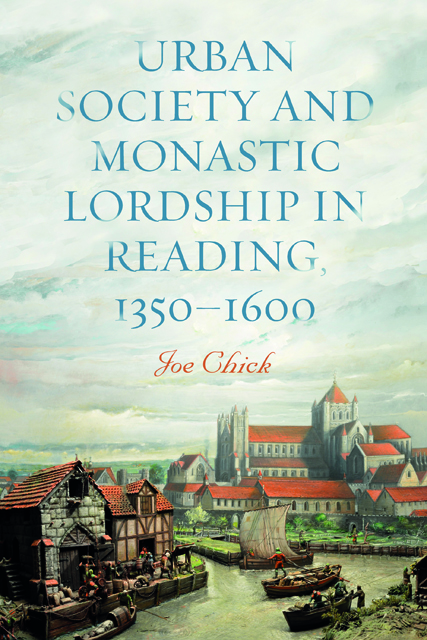Book contents
- Frontmatter
- Dedication
- Contents
- List of Illustrations
- Acknowledgements
- Abbreviations
- Notes on the Text
- Introduction
- 1 Setting and Society
- 2 Political Life
- 3 Economic Life
- 4 Religious Life
- Conclusions and Outlook
- A Social Network Analysis Datasets and Forms of Analysis
- B Trades Categorised by Status
- C Trades Categorised by Sector
- Timeline
- Bibliography
- Index
Introduction
Published online by Cambridge University Press: 17 December 2022
- Frontmatter
- Dedication
- Contents
- List of Illustrations
- Acknowledgements
- Abbreviations
- Notes on the Text
- Introduction
- 1 Setting and Society
- 2 Political Life
- 3 Economic Life
- 4 Religious Life
- Conclusions and Outlook
- A Social Network Analysis Datasets and Forms of Analysis
- B Trades Categorised by Status
- C Trades Categorised by Sector
- Timeline
- Bibliography
- Index
Summary
On 14 November 1539, Abbot Hugh Faringdon left his gaol cell. Led by Sir John Williams, sheriff of Berkshire, his walk through Reading would be the final journey of his life. Once a close friend of Henry VIII, Abbot Hugh had refused to surrender his abbey or deny the supremacy of the Pope. Led to a site near the abbey gates, he was hung, drawn, and quartered. His rotting remains were left to demonstrate to Reading’s inhabitants the fate of those who defied the Henrician Reformation.
This violent moment might be seen as a turning of the tables after four centuries of struggle between the town and its monastic lord. Towns held by monasteries have traditionally been associated with robust lordship and violent town–abbey relations. Undoubtedly, they saw some dramatic clashes. The most iconic was the beheading of John Cambridge, the prior of Bury St Edmunds, along with a monk called John Lakenheath during the Peasants’ Revolt of 1381. The same year saw rebellions in St Albans, Abingdon, Peterborough, and Dunstable. Similarly, the year 1327 had seen risings in Bury St Edmunds, St Albans, and Abingdon, including the abduction of the abbot of St Edmunds who was held hostage in Brabant. Yet historians give disproportionate attention to violent moments that were the exceptions rather than the rule. Through a case study of Reading, I reassess this portrayal of monastic towns and explore the impact of the Dissolution, which brought the sudden removal of a powerful lord.
English Monastic Towns
The traditional image of English monastic towns was forged to a great extent by Norman Maclaren Trenholme in his 1927 work The English Monastic Boroughs. While more recent works have expressed some reservations, the premise is still widely accepted. Samuel Cohn acknowledges a frequent bias towards three particular settlements with major instances of violence (Bury St Edmunds, St Albans, and Abingdon), albeit in a chapter which, itself, gives greatest attention to these three. The most direct challenge comes from James Clark. Focusing on the role of monasteries in the spiritual life of the laity, he highlights instances of collaboration between monks and their surrounding community.
- Type
- Chapter
- Information
- Publisher: Boydell & BrewerPrint publication year: 2022



